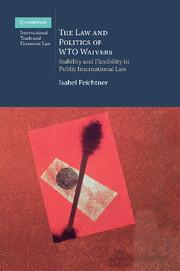Book contents
- Frontmatter
- Contents
- Acknowledgements
- 1 Why study the WTO waiver?
- Part I The stability/flexibility challenge in public international law and particularly the WTO
- Part II The practice and law of waivers
- Part III The potential of waivers to address the stability/flexibility challenge in international law
- Bibliography
- Index
1 - Why study the WTO waiver?
Published online by Cambridge University Press: 05 December 2011
- Frontmatter
- Contents
- Acknowledgements
- 1 Why study the WTO waiver?
- Part I The stability/flexibility challenge in public international law and particularly the WTO
- Part II The practice and law of waivers
- Part III The potential of waivers to address the stability/flexibility challenge in international law
- Bibliography
- Index
Summary
International law and institutions increasingly not only deal with transactions across the borders of sovereign states, but instead promote and protect transnational societal interests. To give but a few examples: international legal regimes obligate states to limit greenhouse gas emissions by national households and industry, to put into place administrative and judicial procedures for the protection of intellectual property rights, or they restrict domestic governmental powers to adopt policies that encroach upon human rights or impede international trade.
The observation that international law promotes transnationally shared societal interests, such as interests in a clean environment, cross-border trade, property or human rights protection does not implicate a value judgment. It does not follow that such law is beyond criticism and exclusively for the good of human kind. Rather it implicates trade-offs – trade-offs between economic and non-economic interests, for example, or trade-offs between individual freedom and public interest policies. The extension of the scope of international law and governance in their subject matters as well as their intrusiveness in domestic administrative, legislative and judicial processes brings to the fore a number of tensions. These include the tension between international governance and domestic government, the tension between societies at different stages of economic development and with different forms of government, the tension between international legal regimes that promote overlapping or contradictory objectives, and finally the tension between, on the one hand, the constant flux of societal preferences and realities and, on the other hand, the rigidity of traditional international law-making instruments, in particular international treaties.
- Type
- Chapter
- Information
- The Law and Politics of WTO WaiversStability and Flexibility in Public International Law, pp. 1 - 4Publisher: Cambridge University PressPrint publication year: 2011



